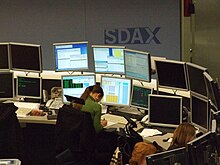Computer trading
With electronic trading is trading with computers and their components and software or trading via computer or understood by computers.
Trading in computers
Computers are commodities that consist of highly complex individual parts and associated components and that are sold as commodities in both retail and wholesale . In both cases, trading has only been possible for the last few decades, since computers have been available as commodities (see on the first home computers - later also personal computers : Simon , Apple I , Spectravideo SV-318, SVI-318 MKII , Atari 400 , Commodore VIC 20 or Texas Instruments TI-99 / 4A ). In the field of professional computers, Zuse KG , taken over by Siemens AG in 1969 and outsourced to the new company Siemens Nixdorf (later to Fujitsu Siemens Computers ), has long been a leader in Europe (see e.g. today: api Computerhandels GmbH in the wholesale sector) .
The trade in computers is partly combined with the sale of other commercial products, such as B. electrical household goods and takes place on a larger scale in electrical retail chains and / or electronics retail chains.
The trade in computers, computer components and software is very dynamic, because newly developed technologies result in constant change in the products and services offered.
If the trade in computers is carried out via online shops , there is also trade via computers.
Trading on computers
Retail and wholesale
The retail or wholesale trade via computers and computer networks is referred to as electronic trade , Internet trade, online trade or e-commerce. Purchases and sales are carried out via networks (remote data transmission), mainly via the Internet (see, for example, eBay - the world's largest "online marketplace").
Stock exchange
Floor trading has almost no function on all stock exchanges and electronic trading dominates through electronic systems for concluding stock exchange transactions . This brings together supply and demand for securities (computer-aided or computer-aided trading).
The Toronto Stock Exchange ( TSX ) was the first in America to introduce computer trading ( CATS ) in 1977 . Bernard L. Madoff offered computer trading in securities in the United States very early on.
If the electronic trading system carries out transactions in securities, currencies or goods automatically when there are suitable offers to buy and sell, it is trading by computer.
Trading through computers
Trading by computer is automated trading (also: automated or algorithmic trading or algorithmic trading , algo trading , black box , high frequency trading , flash trading or gray box trading ), especially with securities and other stock exchange products.
Cross-border stock trading
Cross-border stock trading is often carried out by automated computer trading systems , whereby a computer independently compares the prices on different exchanges, taking into account the currency conversion, and sometimes independently sends buy and sell orders to the various exchanges.
High frequency trading
High frequency trading is computerized trading in securities. The high-performance computers act largely independently or with little human intervention within seconds down to the microsecond range according to the previously programmed algorithms in order to react to market changes and make trading decisions.
High frequency trading can be viewed as a special form of automated trading.
literature
- Michael Lewis : Flash Boys. A Wall Street Revolt. WW Norton, 2014, ISBN 978-0-393-24466-3 .
- Peter Kovac (Author): Flash Boys: Not So Fast: An Insider's Perspective on High-Frequency Trading
- Uwe Gresser: Praxishandbuch Hochfrequenzhandel, Volume 1 Springer Gabler, 2015, ISBN 978-3658049348
Web links
- Read Michael Lewis' Flash Boys: A Wall Street Revolt: An adaptation , in English
- Federal Financial Supervisory Authority - Frequently asked questions about the HFT Act
- Review by Alf Mayer, CULTurMAG Hamburg, CrimMag division, May 3, 2014
- FAZ April 27, 2014 (p. 27): Don't be afraid of the Flash Boys ( online )
Individual evidence
- ↑ Hannah Leimert, Structural Analysis of the Vienna Computer Trade, Vienna ( Memento of the original from November 28, 2016 in the Internet Archive ) Info: The archive link was inserted automatically and has not yet been checked. Please check the original and archive link according to the instructions and then remove this notice. , Vienna University of Economics and Business , March 12, 2015, p. 6.
- ↑ Barbara Kastner, The New Market in the National and International Context , Hamburg 1999, thesis at the Georg-Simon-Ohm University in Nuremberg, ISBN 978-3-8386-1480-9 , p. 12.
- ^ SEC Expected to Limit 'Flash' Trading
- ↑ Key Trends in Global and Asian Electronic Trading: dark pools, regulatory issues, and technology matters. SunGard, accessed on November 16, 2016 (English): "revolutionary changes in high frequency cross-border trading, together with the increasing popularity and prevalence of dark pools and algorithmic trading"
- ^ Author: FAZ correspondent Hendrik Ankenbrand


